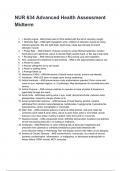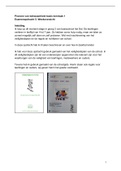NUR 634 Advanced Health Assessment
Midterm
1. + Dunphy signal - ANS-(sharp pain in RLQ elicited with the aid of voluntary cough)
2. + Obturator Sign - ANS-right hypogastric ache, irritation of obturator muscle by using
infected appendix: flex pt's right thigh, bend knee, rotate leg internally to stretch
obturator muscle.
3. + Psoas Sign: - ANS-irritation of psoas muscle by using inflamed appendix, location
hand above pt's right knee, ask pt to elevate thigh towards hand, or flex leg at hip=ache.
4. + Rovsing Sign: - ANS-rebound tenderness in RLQ during LLQ short palpation.
5. 5A's: assesses pt's readiness to quit smoking. - ANS-o Ask approximately tobacco use
6. o Advise to cease
7. o Assess willingness to try and cease
8. o Assist in quitting strive
9. o Arrange follow up
10. Abducens (CNVI) - ANS-Movement of lateral rectus muscle, actions eye laterally.
11. Achalasia - ANS-LES does no longer open during swallowing.
12. Actinic keratosis: - ANS-precancerous scaly erythematous papules 2-5mm come and
cross on sun- exposed regions, tx: Cryotherapy. May development to nonmelanoma skin
cancer.
13. Actinic Purpura: - ANS-crimson patches or macules on back of palms & forearms in
aged-fade through the years.
14. Acute Iririts - ANS-deep aching ache in eye, small, abnormal scholar, reduced vision,
photophobia, caused by Herpes Zoster or tb.
15. Acute symptomatic seizures: - ANS-because of head trauma, alcohol, cocaine,
withdrawal from alcohol, benzodiazepines, barbiturates, hypoglycemia, hypocalcemia,
hyponatremia, stroke, encephalitis or meningitis.
16. Allen Test: - ANS-compares patency of ulnar & radial arteries. Ask pt to make fist,
compress each radial & ulnar artery, ask pt to open hand, palm is now faded, launch
pressure over ulnar artery, if artery is patent, hand turns pink in 3 seconds.
17. Alopecia Areata: - ANS-unexpected onset, definitely demarcated, localized oval patches
of hair loss leaving easy skin, no scaling or erythema.
18. Amblyopia - ANS-Reduction in vision inflicting lack of binocular imaginative and
prescient from cataracts or untreated strabismus (pass-eyed detected with
cover-discover check or Hirschberg Test- will display uneven mild reflex, pt c/o diplopia).
19. Anemia of Chronic Disease: - ANS-normochromic, normocytic, as a result of chronic
systemic contamination, inflammation, or malignancy, or decreased erythropoietin in
kidney failure. RDW: normal, MCV: everyday.
,20. Angina Pectoris (solid angina): - ANS-temporary myocardial ischemia from coronary
atherosclerosis, retrosternal ache or throughout chest radiating to decrease jaw, neck,
epigastric, pressing, squeezing, heavy, lasting three-10 min, worse w/ exertion or
pressure, alleviated by means of rest and nitro.
21. Angry affected person - ANS-acknowledge state of affairs, try and make amends, avoid
reinforcing complaint of other clinicians, do no longer lead them to decrease voice before
everything, pay attention them 1st.
22. Anxiety: - ANS-Generalized Anxiety Disorder-immoderate worry over 6-months, social
phobia- anticipatory tension in social conditions, panic disease-panic assaults, PTSD-re-
experiencing stressful occasion, avoidance, or persistent poor mood.
23. Aortic Regurgitation: - ANS-excessive pitched, decrescendo, LSB, "crushing" angina,
dyspnea, bounding pulses.
24. Aortic Stenosis: - ANS-systolic ejection @ URSB, crescendo-decrescendo first-class
25. heard leaning ahead.
26. APETM - ANS-Aortic: right 2d intercostal area.
27. Pulmonic: left 2nd intercostal space
28. Erbs: left 3rd intercostal area
29. Tricuspid: close to left decrease sternal border, 4th intercostal area
30. Mitral: PMI, fifth intercostal area, midclavicular line.
31. Aphasia: - ANS-not able to talk or apprehend. If Wernicke=temporal lobe lesion, unable
to recognize/understand, speak fluently. Brocas=frontal lobe lesion, unable to talk,
speech is nonfluent, gradual w/few words.
32. Aphonia - ANS-loss of voice r/t laryngitis or CN X paralysis.
33. Appendicitis: - ANS-Inflammation of appendix w/distention or obstruction, poorly
localized periumbilical pain migrating to RLQ at McBurney's Point: between umbilicus &
anterior advanced iliac spine, if pain subsides=perforation, N/V from ache.
34. Asteatosis: - ANS-Dry, flaky, rough, itchy pores and skin.
35. Asthma: - ANS-reversible airflow obstruction w/ bronchial hyperresponsiveness &
irritation. Percussion=resonant to diffusely hyperresonant, breath sounds=wheezes or
feasible crackles, tactile fremitus decreased. S/S: expiratory wheezing, chest tightness,
dry cough, hx: allergic reactions.
36. Athetosis: - ANS-sluggish/twisting movements of fingers from spasticity or cerebral
palsy.
37. AV Banking - ANS-vein is twisted on distal aspect of artery
38. AV Nicking - ANS-vein stops suddenly on either side of artery, arteries indent and
displace veins, because of HTN
39. AV Tapering - ANS-vein "winds" or tapers down on either facet of artery.
40. Baker Cyst - ANS-popliteal cyst from distention of gastrocnemius semimembranosus
bursa d/t arthritis or trauma.
41. Basal cellular carcinoma: - ANS-pink patch, plaque, or papule does now not heal, focal
scaling, pearly- domed nodule w/overlying telangiectasia vessels, ulceration, crusting.
Rarely metastasizes, non-healing rolled border.
42. Biliary Colic: - ANS-Sudden obstruction of cystic duct or not unusual bile duct by a
gallstone, RUQ or epigastric pain radiates to right shoulder/scapula, consistent aching
, NOT colicky lasting >3hrs, speedy onset over minutes subsiding gradually, worsened
with the aid of fatty food, precedes Cholecystitis, anorexia, N/V.
43. Bipolar- - ANS-agitated/expansive movements, euphoria, flight of ideas-non-stop float of
expanded speech w/ abrupt changes from one topic to some other, loud speech of a
manic episode.
44. Blepharitis: - ANS-persistent infection or infection of eyelids, burning, itching, tearing,
eye ache, conjunctival erythema, red eyes, gritty sensation, scaly, greasy flakes, crusted
margins, light sensitivity. Posterior more commonplace, dysfunction of meibomian gland
within eyelid: this gland secretes oil to lubricate the eye. Tx: topical erythromycin
ointment and heat compresses to launch obstructions in meibomian gland.
45. Breast Cyst: - ANS-a while 25-50, soft to firm, round, cell, smooth. Ultrasound,
mammogram, or biopsy.
46. Bronchial breath sounds - ANS-complete inspiratory & expiratory phase w/ louder idea
that is heard over trachea & larynx
47. Bronchitis: - ANS-immoderate mucus production in bronchi, continual obstruction of
airlines, continual productive cough, modern dyspnea, recurrent resp infections,
annoyed by way of smoking, exertion, alleviated by rest and expectoration, hx: COPD,
smoking.
48. Bronchovesicular breath sounds - ANS-complete inspiratory section with quick and
smooth expiratory segment, heard over hilar location (center of lungs close to coronary
heart).
49. Bullous Myringitis: - ANS-painful hemorrhagic vesicles on TM or ear canal, bloody
otorrhea, otalgia, conductive listening to loss.
50. Cardiac Cycle: Blood Flow - ANS-Deoxygenated blood to SVC to right atrium via
tricuspid valve, to right ventricle, to pulmonary artery to lungs to become oxygenated, to
pulmonary veins to left atrium, via mitral valve, to left ventricle, to aorta to systemic circ.
51. Cardiac Cycle: Diastole - ANS-Ventricular rest, aortic valve is closed stopping regurg
from aorta to left ventricle, mitral valve is open allowing blood to go with the flow from L.
Atrium to L. Ventricle, pulmonic valve closes, tricuspid valve opens as blood flows into
right atrium.
52. Cardiac Cycle: Systole - ANS-Ventricular contraction, aortic valve is open, allowing
ejection of blood from left ventricle into aorta; mitral valve is closed preventing blood
from regurging into the l. Atrium. During systole, pulmonic valve opens, tricuspid closes
as blood is ejected from right ventricle into pulmonary artery.
53. Cataracts: - ANS-sluggish cloudiness/opacification of the lens from DM, overexposure to
sun, long-term steroid use, diuretics, bad eating regimen, smoking, ETOH, age, trauma,
lead exposures=NO red reflex, Leukoria-white reflex present, blurred/cloudy imaginative
and prescient, halo round lights, dwindled night time imaginative and prescient, diplopia,
fall hazard.
54. Causes of Changes in Pulses: - ANS-cardiogenic surprise=thready, vulnerable.
Bounding=aortic insufficiency, chronic arterial insufficiency=absent/vulnerable pulses.
55. Cellulitis: - ANS-superficial is erysipelas: mc reason=strep, tx: penicillin
56. Central vertigo - ANS-atherosclerosis or MS or TIA-regularly surprising.






